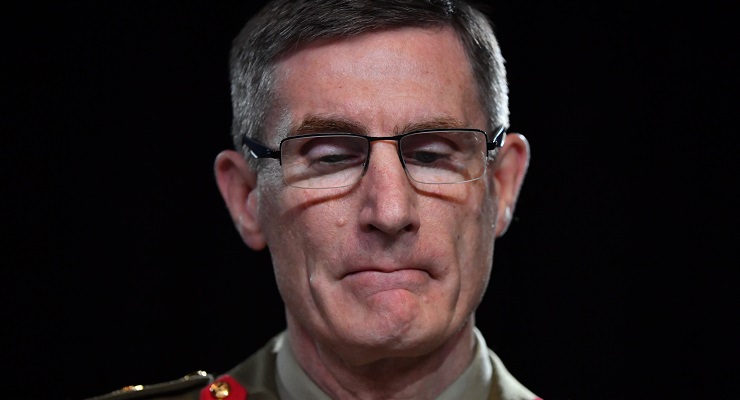
So much has been said about the Brereton report in recent days, but how could the shameful and criminal episodes we keep reading about have come this far without being stopped?
Anyone who has taken even a passing interesting in the cleaning up of the Australian police forces over the past three decades will find eerily familiar lessons at the heart of the disgraceful cruelty revealed by Justice Paul Brereton.
And principally it lies with how complaints are dealt with: once a reason to persecute the complainants, now a means to prosecute those who step over the line.
History tells us that poor human behaviour not detected is almost always repeated.
This is what went wrong with Queensland policing in the ’70s and ’80. And if you look at the Brereton report, it displays how it went wrong in the SAS, where a group of supremely-trained soldiers, told they were special, made their own laws.
Is this the fault of the soldiers whose moral compass spun completely out of control? Of course. But should the brass be free of blame? Absolutely not.
If they’d bothered to step outside their military bubble and look at how other uniformed services had changed, they would have recognised the signs.
They might even have instituted some of the systems that have cleaned up the police services across Australia and spared what should be the elite part of the military from public shame and loss of confidence.
Justice Brereton provides the forensic clues here:
First, operational reporting “routinely justified engagements which might otherwise appear questionable, and appeared more designed to rationalise actions and deflect higher criticism than to accurately report the facts’’.
Second, the “boilerplate’’ language used “obscured the true facts of a killing’’ and in the process impeded any reviews. Brereton gives a stellar example of what he means: instead of saying engagements with unarmed people, language like “insurgent manoeuvring to a position of tactical advantage’’ was used. This suggested that combat with unarmed people was within the rules.
Third, inquiry officers generally discounted local complaints as “insurgent propaganda or motivated by compensation”: “Likewise, complaints received from government of the Islamic Republic of Afghanistan, representatives of the International Committee of the Red Cross, or the Afghan Independent Human Rights Commission were generally discounted,’’ his report says.
Fourth, scrutiny by the ADF Investigative Service was rebutted on the grounds of operational security or “superior knowledge of the local battlespace’’.
Fifth, if headquarters challenged — because on occasions it was not confident that information being received from the field was accurate — they ultimately buckled to the “perceived obligation at all levels to trust and support subordinates”.
You can see how episodes of horrible wrongdoing could be swept under the carpet. But he doesn’t stop there.
Sixth, the officers conducting initial investigations lacked independence and curiosity and were shy of the “right experience, access, support and resources to get to the core of what had happened. Officers generally assumed innocence and their reports almost invariably exculpated force elements”.
Seventh, some of the special forces operators felt immune from external inquiry as demonstrated by a “range of unacceptable behaviours such as the use of [planted weapons], false reporting and actively conspiring to obstruct oversight by command and avoid scrutiny and possible disciplinary action by lying’’ to inquiry officers. In short they had the “arrogance to thwart external inquiry’’.
But it’s not only the problems that mirrored those in state polices services; many of the broad recommendations also point to how police regimes have been overhauled to prevent corruption. And those recommendations have sat on the public record for decades.
For example, Brereton nominates one of the problems as the messy approach to inquiries, with separate inquiries looking at separate events. That was able to hide “the emergence of patterns’’.
A standing professional inquiry agency would be better positioned to do so. Any inquiry mechanism needs to have a substantial degree of independence, an index of suspicion and the forensic skills, experience and techniques to question the veracity of evidence and to test it.
Sound familiar?
So does this: “The mandatory use of body cameras by police has proved successful in confirming lawful actions, rebutting false complaints and exposing misconduct and is now widely accepted.”
The Brereton report says privately-owned helmet cameras in Afghanistan had “unintentionally resulted’’ in the exposure of at least one alleged war crime and that cameras — more than any other measure — might be the assurance needed that force was both lawful and appropriate.
Amongst the queue of recommendations lies another crucial one, that has been repeatedly recommended to stymie bad behaviour: whistleblower protections.
“Members should have access to an alternative safe reporting line, separate from their chain of command, to report or discuss concerns about suspected unlawful behaviour,’’ Brereton says.
The Brereton report reveals so much, not least what a good tutor history can be.








And the military lawyer, David McBride, still faces life imprisonment for blowing the whistle, and Julian Assange faces never-ending solitary confinement torture for publishing other war crimes. And then we wonder why the crimes continue.
As always, whistleblowers come off worst, put under extraordinary and reduced to penury.
If lucky.
And a lesson for those politicians that took the us into Afghanistan and that mine-field of temptation, as a door-opener to Iraq – to then strip necessary resources (to properly prosecute that war) from that initial entry point, to pursue their main objective (Iraq) – in a war that was going to be over before we knew it?
On nobbled intelligence. Behind leaders in Cheney-Wolfowitz-Rumsfeld-Powell-Feith-Rice-Bush-Blair-Howard with King’s Murdoch handling PR.
How those stripped resources could have made a difference. When will we have a “look” at that?
We have eulogised the armed forces and elevated the ANZAC legend beyond reality. It should come as a surprise to no one that elite soldiers can be naughty boys, it is what the army expects of them. Part of the role is to scare the bejeezus out of the enemy by doing whatever. We are being extremely naive about wars of any kind and the behavior of the participants.
There is world of difference between the SAS scaring the wits out of someone or being “naughty boys” and the alleged “blooding” by the murder of a non combatant or prisoner by a junior officer on the orders of their commanders in the field.
if anyone has not seen the footage from a camera on the helmet of the dog handler broadcast on the ABC’s 4 corners program, it makes for a sobering look at an SAS raid.
Why did the supervising officers not open their ears and eyes to complaints from credible sources?
The group mindset was that all complaints were Taliban propaganda, was and is a dangerous thing.
The only things that have forced change were the public statements and evidence gathered by David McBride and the footage.
After the AFP were sent into the ABC headquarters in a vain attempt to prevent its broadcast.
This is why the prosecution of David McBride is such an anathema.
If the reform of the Army and the SAS is what is needed then his input into the checks and balances required will be invaluable.
As he saw first hand how there is no hearing from those that are deaf even to reports from their own members.
Australian forces, like many others of many nations over time, have gone to another country, killed citizens there, often innocent bystanders, and, like all those others of imperious intrusion, are murderers. History is loaded overfull of such stories. Were Afghan forces in Pitt st. Sydney, killing Australian citizens, and more?
I’m not sure the Victorian Police Force, for one, is such a wonderful example of probity. When there’s a complaint, police investigate themselves and usually find “nothing to see here.”
There’s a certain irony to be found in one of this morning’s entries in The Worm, i.e.
Why do the Victorian police keep getting caught with far-right associated symbols?
The state of Victoria needs an ICAC because the police investigating the police does not work, ever.
Gladys has dismantled the oversight panel of the police because she seems to be under the sway of Slomo’s bestie and Police Commissioner.
I don’t think she wanted the commissioner having to face the music of aprox 800 children young as 11 strip searched for drugs.